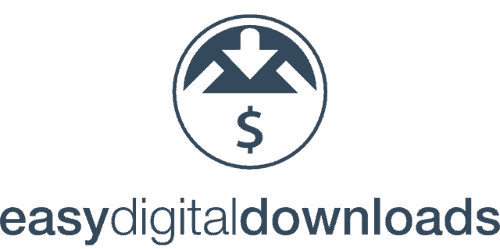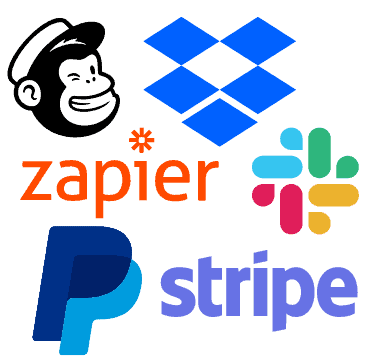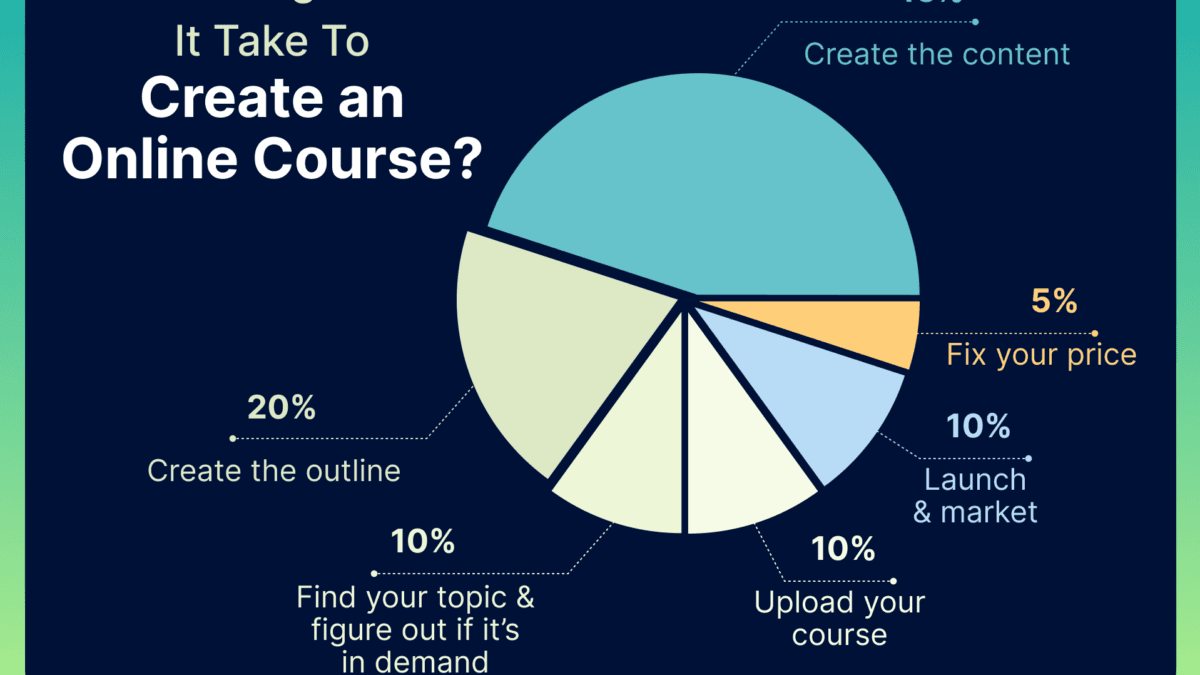Thanks to the internet, selling digital products is easier than ever. In this post, we’re going to share the best platforms to sell digital products on so you can have a better idea of which one is a better fit for your online business. We’ll be discussing several options, so you can find the best ecommerce platform to easily sell digital products on.
This page uses affiliate links, which means we get a commission if you decide to sign up. None of the fees of these resources have been increased to compensate us. We only recommend tools that we use personally in our business and that we believe are useful and up to our standards.
What should I look for when choosing a platform?

When selecting the ideal platform to sell digital products, it’s crucial to consider a range of factors that align with your business goals and the nature of your offerings. Here’s a more expansive guide on what to keep in mind:
Digital Download Capabilities
While this might seem obvious, it is crucial that your platform is optimized for digital content. Not all ecommerce platforms have necessary features, like easy download links or coupon codes that work for digital products. In addition, you might need a platform that can accommodate larger digital file formats and sizes.
Checkout experience
A smooth and intuitive checkout process across all devices can boost conversions. You’ll also want to make sure they handle recurring payments if you sell digital subscriptions or memberships.
Product limitations
Does the platform restrict the number of courses you can offer, or can you sell unlimited courses and unlimited products? In addition, a lesser known limitation to consider is bandwidth. If you are selling large digital products, having unlimited bandwidth can save you a ton of time.
Customer Experience
It is best to opt for platforms that prioritize user-friendliness. A complex interface can deter you from efficiently managing your products and might also confuse your customers.
Budget Considerations
While some platforms might charge transaction fees (either a fixed amount or a percentage of the sale), others might have monthly or annual fees. In addition, free platforms can be tempting, but they usually come with serious limitations, so it is important to balance cost with the features you need for your business.
Support
A responsive support team and an active user community can be invaluable, especially when you encounter challenges or need guidance.
Recommended Digital Product Platforms
With these considerations in mind, here are the top digital product platforms in 2023.
Easy Digital Downloads
If you’re looking for the best ecommerce platform that’s specifically designed for selling online products, Easy Digital Downloads (EDD) is a great option. This platform was created with digital product vendors in mind and offers features like automatic license generation, automatic update checking, and the ability to offer “freemium” products.


EDD also integrates with a number of popular payment options and processors, making it easy to accept payments and get started with selling digital products online.
Easy Digital Downloads works if you need a way to sell digital products on WordPress. You can sell digital downloads and all kinds of digital products like ebooks, WordPress plugins, PDF files, and more with EDD.
Other features that will meet your online business needs include discount code creation, a flexible shopping cart system, unlimited file downloads, download activity tracking, full data reporting, and more.
Pros
Easy Digital Downloads is specifically designed for selling digital goods, making it a great option if that’s what you’re looking for. It integrates with a number of popular payment processors, making it easy to accept multiple payment methods and get started with selling digital products online. Additionally, it offers features like automatic license generation, automatic update checking, and the ability to offer “freemium” products.
It has several helpful features that you’d want when you start selling digital goods online.
It also has an extensive extensions catalog as it integrates with several popular plugins and services like MailChimp, Zapier, Dropbox, Stripe, PayPal, AffiliateWP, Slack, Kit, and more.
Finally, EDD has an active community of users that you can look to for support.


Cons
While EDD is a great ecommerce platform for selling digital products, it doesn’t work well if you want to sell physical products as well. Additionally, the platform can be difficult to use if you’re not familiar with WordPress.
With the most basic plan costing $99.50 USD (special introductory pricing) and subsequent renewals being full-price at $199 USD, using EDD can be costly if you’re just starting out or if you’re not making a lot of sales. You may also find the features limited for what you’re paying.
Shopify


Shopify is one of the most popular ecommerce platforms and is a great option to sell your digital goods. While it’s not as focused on digital as Easy Digital Downloads, this full-service ecommerce platform still offers everything you need to make it easy to sell digital products online. For example, you could sell products like HRIS software by creating an online store and listing your products for sale, and customers can then easily purchase them through the platform.
Some of the features that will help with your business needs include automatic taxes, inventory management, abandoned cart recovery, product reviews, discount codes, multiple payment options, and more.
Shopify also has an extensive app store with over 2000 apps to choose from. This is helpful if you want to add features or integrations that are not available on Shopify by default.
Pros
Shopify is a very popular ecommerce platform that’s great for selling digital products. But is it the best ecommerce platform for you?
It offers features like automatic taxes, inventory management, abandoned shopping cart recovery, product reviews, and discount codes. Additionally, Shopify has an extensive app store with over 2000 apps to choose from.
Shopify is a platform that makes it easy to sell. You can be up and ready to run and sell products online in no time. You can even connect your marketing tools or social media to it. Additionally, Shopify offers 24/7 customer support which is great if you need help with anything.
Cons
Shopify does have a few drawbacks. First, it’s not as focused on digital as Easy Digital Downloads. Furthermore, it’s not as customizable as some of the other options.
Additionally, it can be more expensive than some of the other options on this list. The most basic plan starts at $29 USD/month and goes up to $299 USD/month for the most advanced plan. It also charges transaction fees.
WooCommerce


WooCommerce is a popular WordPress plugin that turns your WordPress website into an eCommerce store. While it’s not as focused on digital products as Easy Digital Downloads, it’s still a great option if you want to sell digital products online.
Some of its features include automatic taxes, inventory management, abandoned cart recovery, product reviews, discount codes, and more.
WooCommerce also has an extensive plugin directory. This is helpful if you want to add features or integrations that are not available on WooCommerce by default.
Pros
WooCommerce is a popular WordPress plugin that’s great for selling digital products. It offers features like automatic taxes, inventory management, abandoned cart recovery, product reviews, and discount codes.


Additionally, its extensive plugin directory has over 55,000 plugins to choose from. It can connect to your marketing tools and social media, making it easy to promote your products and drive sales.
WooCommerce is also an ecommerce platform that’s very easy to use and is one that is very customizable.
You can easily add features and integrations to your WooCommerce store with the help of plugins. Additionally, it’s a free platform which makes it great for those on a budget.
Cons
While WooCommerce is a great platform for selling digital products, it can be more difficult to use if you’re not familiar with WordPress. Additionally, it’s not as focused on digital products as Easy Digital Downloads and can be less reliable because of that.
WooCommerce Payments also charges transaction fees, which can add up if you’re making a lot of sales.
Gumroad


Gumroad is a great platform for selling digital products. It’s very easy to use and offers a lot of features that are helpful for online businesses.
Some of its features include membership creation and subscription setup, multiple currencies, discount codes, license keys, data analytics, and more.
Pros
Gumroad is very easy to use and is user-friendly. It can turn any website or blog into a platform to sell your digital products.


Other benefits include secure file hosting and delivery and easy payment processing (+ multiple payment currencies). In addition to this, since your online store is built on your website, an easy purchase flow allows customers to make purchases without leaving your website.
If you’re trying to build an email list or continue providing value to customers after the sale, being able to sell on Gumroad is great because you will get all of your customers’ information, as opposed to some other third-party services that don’t provide you with this.
Cons
Gumroad doesn’t actually offer the ability to create an online store. It offers the ability to and the convenience of selling digital products right from your website.
When it comes to organizing your products within Gumroad, it is lacking a bit. Your products are viewed in the order they’re uploaded in.
It also lacks more extensive customization options, especially if you want to match the e-commerce side of things to your brand and website.
Amazon
Amazon is a great platform that lets you sell both digital and physical products. It’s one of the most popular and trusted ecommerce platforms out there.
Some of Amazon’s offerings include automatic tax calculation, order management, customer reviews, product ratings, and more.


Pros
Amazon is a great platform for selling digital products because it’s very user-friendly and offers a lot of features that are helpful for online businesses. Additionally, Amazon is a very trusted platform and is known for its excellent customer service.


Another great thing about Amazon is that it’s a very popular platform, so selling on Amazon can help you reach a larger audience. Additionally, Amazon handles all of the shipping and delivery for you (handy if you sell physical products), which can save you a lot of time and money.
Cons
Amazon is a great platform to sell digital downloads and other goods on, but it does have some drawbacks.
Amazon takes a percentage of each sale as a commission fee.
Additionally, Amazon has been known to be very strict with their rules and regulations, so you’ll need to make sure you’re familiar with them before listing your products.
Online Course Platforms
Selling courses online is a great way to make money online. And there are a number of different platforms you can use to do it.
AccessAlly
AccessAlly is a comprehensive course plugin built on WordPress and gives you the power and flexibility that you need to scale. It aims to help you sell more, teach better, and engage your students longer.
Its features allow you to handle everything from payments to membership access, learning management, and integration with your CRM.
Pricing
The pricing starts at $99 USD per month for the Essentials tier and goes up as you upgrade tiers.
Pros
AccessAlly is flexible and has a plethora of features that will help you create and sell online courses. This includes multiple currencies, bulk course enrollment, progress tracking, dripped courses, gamification, and secure file hosting. The drag-and-drop builder makes it easy to put your course together. You can even run an affiliate program or affiliate system with AccessAlly.
AccessAlly also integrates with numerous WordPress plugins and integrations. These include:
- CRM integrations (Keap, ActiveCampaign, Kit, etc.) to connect to your marketing tools
- E-commerce and shopping cart integrations (Stripe, PayPal, WooCommerce, Quaderno, etc.)
- WordPress theme integrations (Beaver Builder, Gutenberg, Elementor, etc.)
- WP plugins and third-party services (Amazon S3, PopupAlly Pro, Zapier, etc.)
There is also excellent customer support available, as well as documentation in the Knowledge Base.
Cons
AccessAlly may have a steep learning curve for some, especially if you’re just starting out. Additionally, it is a WordPress plugin, so you will need to have a self-hosted WordPress site in order to use it.
There is also no free trial period, so you will have to pay for the plugin to try it out. However, there is a 60-day money-back guarantee. There are multiple pricing tiers.
Kajabi
Kajabi is an all-in-one platform that helps you create, market, and sell your online courses. It includes everything you need to launch and grow your business in one place.
Kajabi offers features like customizable landing pages, email marketing, web hosting, course creation, and more.


Pricing
Kajabi offers a free trial. Kajabi’s pricing starts at $149 USD per month for the Basic tier and increases as you upgrade tiers. The pricing of the most popular tier (Growth) is $199 USD per month.
Pros
Kajabi is user-friendly and has a wide range of features to help you market and sell your courses.
Some of Kajabi’s offerings include customizable landing pages, email marketing, web hosting, course creation, and more. There’s also a 14-day free trial.
Kajabi also has customer support and a wide range of integrations, including Zapier, Mailchimp, Google Analytics, and more.
Cons
Kajabi can be a bit pricey for some people. The lowest tier plan starts at $149/month (without the annual billing discount), and the price goes up from there.
Thinkific
Thinkific is a comprehensive platform that helps you create and market online courses, and it allows you to sell online courses as well. It’s designed to be easy to use and is great for those who are just starting out.
Some of Thinkific’s features include built-in Stripe and PayPal integration, customizable coupons, and more.


Pricing
Thinkific offers a free version of their product. The pricing for its paid versions begins at $49 USD per month for the Basic tier, and increases as you scale up.
Pros
Thinkific doesn’t require coding to create courses and offers a simple and intuitive interface. There are multiple pricing tiers, with one of them being free.
It has a drag-and-drop landing page builder as well.
Cons
Thinkific is a closed platform, so it can’t be easily extended by installing add-ons and plugins.
You’re also hosting your website and courses on this closed platform, so there’s no easy way to take your content with you when you cancel or decide to move on. It also lacks full design flexibility.
Podia
Podia is an all-in-one digital products platform that helps you sell digital downloads, online courses, and memberships. It’s designed to be easy-to-use and is great for those who are just starting out.


Pricing
Podia offers a free version of their product, so there is no free trial available for their paid tiers. The pricing for its paid versions begins at $39 USD per month, and increases as you go up the tiers.
Pros
Podia is user-friendly and has a wide range of features to help you market and sell your courses.
Some of Podia’s features include customizable landing pages, email marketing, web hosting, course creation, and more.
Cons
While there is a free version of the platform for selling online goods and courses, Podia charges you an 8% in transaction fees in this tier.
Podia great for beginners who are just starting out and don’t need full customizability yet, but there is limited design flexibility for those who want full control.
In addition, Podia doesn’t offer localized languages and currencies. They offer payments in one currency, and courses and programs in one language.
Mighty Networks
Mighty Networks is an all-in-one platform that helps you create and grow a membership site or online course. It’s designed to be easy to use and is great for those who are just starting out.


Mighty Networks is well-known for its community engagement. Most people choose this platform because it’s similar to a social media network. There is also a mobile app that users can download to access their Mighty Network.
Pricing
Mighty Network offers two paid plans: Community and Business. The Community plan costs $39 USD per month, while the Business plan costs $119 USD per month.
Pros
Mighty Networks offers a 14-day free trial.
Some of Mighty Networks’ features include community building, Mighty Network feed personalization, a course builder, multiple payment options (recurring payments, local currencies), and an Ambassador or affiliate program.
Mighty Networks is excellent if you want to build a community and really boost community engagement because it’s designed like a social network.
Cons
Even though Mighty Networks excels at building conversations and community, sometimes these can become too much to manage and some may find themselves hiring a full-time community manager.
Mighty Networks also lacks learning management system (LMS) functionality. It’s better suited for businesses that put community engagement and members first but also need a basic course builder to share additional resources.
Payment options might be slightly limited. Mighty Networks integrates with Stripe, but not with PayPal or any other payment processor.
ClickFunnels
ClickFunnels is a lead generation platform with a primary focus on sales funnels. ClickFunnels offers a membership funnel that allows you to capture leads, introduce an offer, and deliver it on its platform as a membership.


ClickFunnels is meant for a simple, singular membership setup with no frills. If you’re looking to get your membership site up quickly, ClickFunnels may be a good choice for you.
Pricing
ClickFunnels offers two tiers of pricing: Basic for $97 USD per month and Platinum for $297 per month.
Pros
ClickFunnels offers a 14-day free trial.
Some of ClickFunnels’ offerings include pre-built templates, email integrations, a page builder, customizable membership funnels, and more.
Everything is also organized in one simple dashboard, which makes it easy to see your progress and where you need to make changes.
Cons
While ClickFunnels offers some great features for membership sites, its focus is on sales funnels.
This means that the platform lacks certain membership site qualities that another platform for selling digital items might have, such as an affiliate system or affiliate program and robust community forum.
You also do not have the flexibility of creating your own custom designs, as everything is based on templates offered by the platform.
So, if you’re looking for a platform to primarily sell digital products and want more than just a sales funnel, ClickFunnels might not be the best option.
Overall…
When it comes to the best platform to sell digital products, it really depends on your needs as a business owner and the type of offering you’re trying to sell. A platform for selling online courses can look different from platforms used to sell digital downloads.




Each platform offers different features, pricing plans, and integrations. It’s important to assess what you need in order to make a decision about which ecommerce platform is best for you to sell your digital products on.
When it comes to price, it’s important to consider what you need in a platform and what you’re willing to spend. Some platforms offer a free trial, which is helpful in deciding whether or not the platform is a good fit for your business.
Other platforms offer different pricing plans, so it’s important to assess what you need in order to make a decision about which ecommerce platform is best to sell your digital products on. Each platform offers different features, so it’s important to consider what you need in order to make the best decision for your business.
If you want to sell digital downloads or some other type of digital offering, hopefully this blog post has helped you get a better understanding of the best ecommerce platforms out there.
What’s been your experience with using ecommerce platforms to sell digital offerings and downloadable products? What are the best platforms for selling digital downloads and other digital goods, from your experience? Let us know in the comments below!
FAQs
1. What is a digital product?


A digital product is a product that exists in digital form. This can include items like WordPress themes, templates, online courses, ebooks, and more. If you’re trying to sell anything that a customer can download and use digitally, it’s considered a digital product.
2. Why sell digital products?
There are a few reasons why you might want to sell products online.
For one, they’re easy to create and distribute. You don’t have to worry about manufacturing or shipping costs, and they can be delivered instantly to customers. Digital products also often have a lower cost of goods sold (COGS), which means you can price them lower and still make a profit when you sell them.
Additionally, the benefit of digital goods and being able to sell digital products online is that they have a wider audience since they can be purchased by anyone in the world with an internet connection. Physical products are limited by shipping restrictions, but digital products can be sold to anyone, anywhere.
3. Why should I consider selling digital products over physical ones?
Digital products eliminate the need for inventory, shipping, and manufacturing, reducing overhead costs. They can be sold worldwide without geographical limitations, offering scalability and higher profit margins.
4. Which platforms are best for beginners with no technical knowledge?
Platforms like Shopify, Wix, and Squarespace are user-friendly and designed for beginners, offering drag-and-drop interfaces and pre-designed templates.
5. Are there any platforms specifically tailored for selling online courses and memberships?
Yes, AccessAlly is a top-tier platform tailored for selling online courses and memberships. It’s comprehensive, user-friendly, and integrates seamlessly with popular tools. If you’re serious about offering courses or memberships, consider signing up for AccessAlly. See it in action here.
6. Are there hidden costs associated with any of these platforms?
While many platforms have transparent pricing, some might charge transaction fees, payment processing fees, or costs for premium plugins and integrations. Always review the platform’s pricing details and terms before committing.
7. Which platforms offer the best customization options for my digital products?
WooCommerce and Shopify offer extensive customization options through plugins, themes, and coding flexibility, allowing you to tailor your store to your brand’s needs.
8. Are there platforms that integrate with popular email marketing tools or CRMs?
Yes, many platforms offer integrations with popular email marketing tools and CRMs. For instance, AccessAlly, Shopify, and WooCommerce have integrations with tools like MailChimp, Kit, and ActiveCampaign.
9. Which platforms support subscription-based pricing models?
Several platforms support subscription-based pricing, but AccessAlly stands out with its robust subscription management features. If you’re looking to offer subscription-based digital products, AccessAlly is a top choice to consider.
10. How secure are transactions on these digital product platforms?
Transactions on reputable platforms like Shopify, WooCommerce, and AccessAlly are highly secure, employing SSL certificates and adhering to PCI DSS standards to ensure data protection.
11. Which platforms offer 24/7 customer support or have active user communities for assistance?
Shopify, Wix, and Squarespace provide 24/7 customer support. Platforms like WooCommerce and WordPress have vast active user communities and forums for peer assistance.
12. Can I integrate my existing website or blog with any of these platforms?
Yes, platforms like WooCommerce can be integrated with existing WordPress websites. Shopify and Wix also offer embedding options to integrate with existing sites or blogs.
13. Which online platform has the most third-party apps or plugins?
WooCommerce, being a WordPress plugin, benefits from the vast WordPress ecosystem, offering thousands of plugins. Shopify also boasts a rich app store with numerous extensions for added functionality.
14. Are there platforms that come with built-in audience engagement tools or community-building features?
AccessAlly offers built-in engagement tools like quizzes and progress tracking. Platforms like Mighty Networks and Kajabi emphasize community-building features, fostering user interaction and engagement.
Note: This post uses affiliate links, which means we get a commission if you decide to sign up. None of the fees of these resources have been increased to compensate us. We only recommend tools that we use personally in our business and that we believe are useful and up to our standards.




